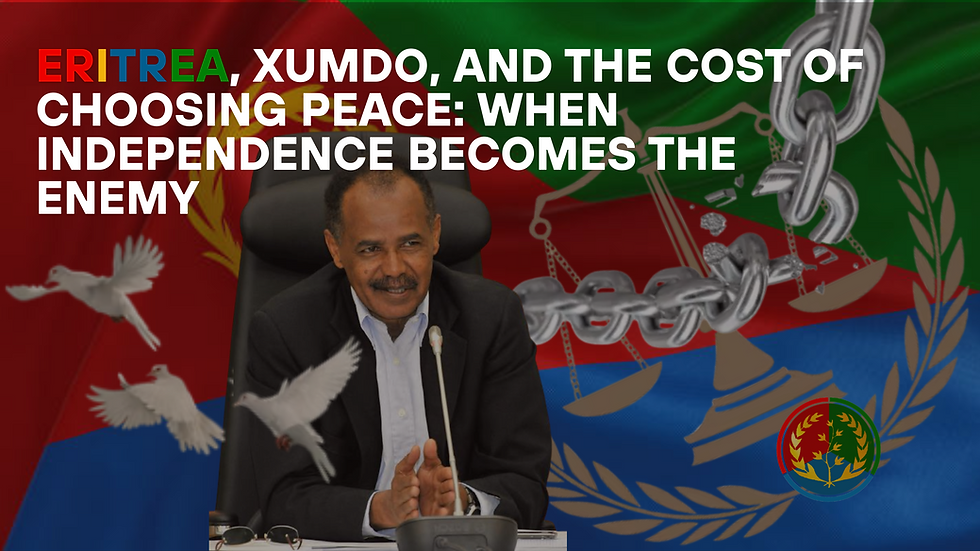Eritrea Has Never Denied Ethiopia Port Access — The Real Blockade Was Political
- Nakfa Eritrea
- Mar 22, 2025
- 3 min read
One of the most dangerous and persistent lies pushed by Western media is that Eritrea denied Ethiopia access to the Red Sea. This myth has been repeated so often that it’s treated like fact — but the truth is, Eritrea has never denied port access to Ethiopia. In fact, Eritrea not only offered access, but did so in good faith, as part of a broader vision for regional sovereignty and African unity.
Let’s correct the record once and for all: Eritrea did not “inherit” ports like Assab and Massawa after its independence in 1993. These ports have always belonged to the Eritrean people. They weren’t gifts. They weren’t diplomatic hand-me-downs. They are part of Eritrea’s ancestral coastline and were reclaimed through decades of armed struggle and sacrifice. The idea that Eritrea “inherited” them is a subtle but dangerous form of erasure — one that denies the legitimacy of our liberation and our sovereignty.
After gaining independence, Eritrea extended an open hand to Ethiopia. From 1993 to 1997, Ethiopia freely used the Port of Assab under legal customs agreements. Eritrea never restricted access. In fact, both nations signed the 1995 Treaty of Friendship and Cooperation, reinforcing their commitment to mutual development and peaceful relations. Eritrea’s leadership understood the importance of regional stability and acted accordingly, offering Ethiopia access to the sea as a neighbor, not an enemy.
The rupture came not over ports, but over currency and sovereignty. In 1997, Eritrea introduced the Nakfa, its national currency. Ethiopia rejected Eritrea’s proposal to conduct trade in hard currency or through a clearinghouse — a standard practice between sovereign nations. Instead of accepting this, Ethiopia chose to reroute its trade through Djibouti, abandoning the Port of Assab on its own terms. There was no blockade. No denial. Just a political decision influenced by internal ambitions and external manipulation.
The situation deteriorated further in 1998 with the outbreak of the Eritrea-Ethiopia Border War, centered on the town of Badme. But this was more than a border dispute. Behind the scenes, Western powers — particularly the United States — were backing Ethiopia’s TPLF-led regime, providing arms, aid, and political cover. When the Eritrea-Ethiopia Boundary Commission (EEBC) ruled in 2002 that Badme rightfully belonged to Eritrea, the West did nothing to enforce it. Ethiopia refused to comply. Eritrea was blamed.
Meanwhile, media and UN narratives began to shift. Eritrea was framed as “isolationist,” “aggressive,” and unwilling to engage — all while defending its territory and trying to maintain peace. Then came sanctions in 2009, pushed by the U.S. and its allies based on unverified claims that Eritrea supported terrorism in Somalia — claims that were never substantiated.
And still, despite all this, Eritrea kept the door open.
In 2018, when Ethiopian Prime Minister Abiy Ahmed reached out to reopen peace talks, Eritrea welcomed him with integrity. Port access was back on the table. No preconditions. No revenge. Just the same unwavering commitment to regional unity and cooperation.
But again, Ethiopia — influenced by internal divisions, the resurgence of the TPLF, and foreign pressure — failed to follow through. To this day, Eritrea has not blocked Ethiopia from the sea. What has blocked Ethiopia is a combination of neo-colonial geopolitics, dependency on Western aid, and a political elite more concerned with appeasing foreign powers than building regional trust.
The blockade has never been on Eritrea’s coastline — it’s been on Africa’s ability to control its own narrative.
The truth matters. Eritrea’s stance has been clear, consistent, and principled. We do not operate from bitterness or vengeance. We operate from sovereignty, dignity, and Pan-African solidarity.
Let the record show: Eritrea has never closed its ports to Ethiopia. But the West has closed minds, distorted truths, and deepened the divisions that serve its own interests.
It’s time to reclaim the story — and reclaim the sea.
.png)



Comments